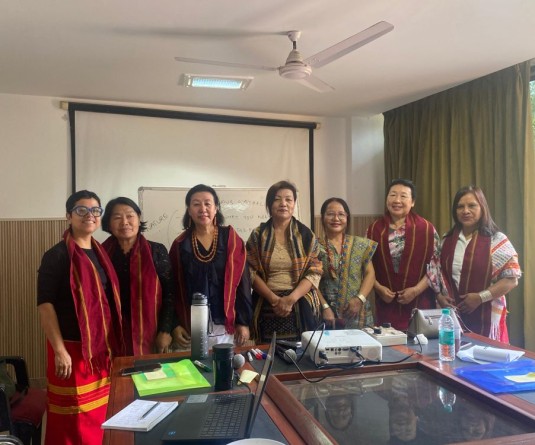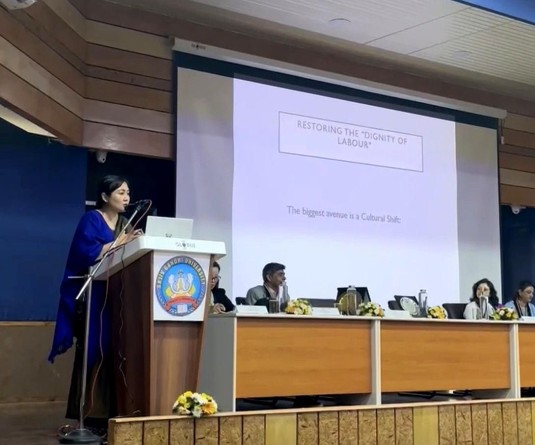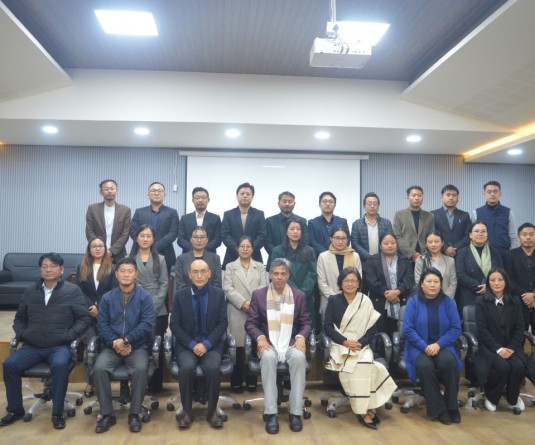
Department’s collaboration for prevention, care & support to PLHA
Chizokho Vero
Kohima | October 28
As part of creating awareness on HIV and AIDS in Nagaland, the state’s power department joined other departments by printing an HIV/AIDS message on monthly electricity bills. “HIV/AIDS is incurable but preventable” reads the message on the monthly bill of the department.
The current prevalence rate of HIV/AIDS in Nagaland is 0.78%. Nagaland, which occupied the second slot among states with highest HIV prevalence rate, has presently climbed down to sixth position.
The departmental response till March 2011 to HIV/AIDS in Nagaland, according to available sources, included the women department which offers nutritional support to female PLHAs through positive network programme started in 2004 wherein 767 women PLHA benefited and women PLHAs have been assisted to form SHGs in 128 villages across 9 districts.
Free transport for PLHA to access treatment was under consideration under transport department while nutritional support for PLHA was also under consideration under food and civil supply department. PLHA to avail Rastriya Swasthya Bima Yojana (RBSY) (National Health Insurance Scheme) was also under consideration under the labour department while social welfare department supports De-addiction & Rehabilitation Centres.
Under youth resources & sports department, NYK and NSS involved during Red Ribbon Express whereas higher education department was involved in forming Red Ribbon Club covering 57 colleges so far in the state.
Home department framed work place policy on HIV & AIDS for police while education department undertakes life skill education & living skills programme from class V-12 through SCERT and NBSE.
SIRD provides training to Self Help Groups on HIV& AIDS while DIPR carries full page article on HIV/AIDS in its monthly newsletter (The Warrior).
During a recent meeting of the State Council on AIDS here, Dr. Nandira, project director Nagaland State AIDS Control Society (NSAC) has communicated a suggested scope for further collaboration of various departments in the state.
It includes:
Department of Rural Development: Incorporation of HIV/AIDS session in all the training programmes, allocation of Indira Awas Yojana (IAY) schemes and Swarnjayanti Gram Swarozgar Yojana (SGSY) for the PLHA and condom promotion for HIV prevention and family planning.
State Institute of Rural Development (SIRD): To increase awareness to VDBs and Village Councils members on HIV/AIDS through workshop/sensitization, inclusion of People Living with HIV/AIDS (PLHA) in the computer literacy programme, support enterprises for sustainable development and condom promotion for HIV prevention and family planning.
Home/Police: HIV/AIDS to be included in the training curriculum of all forces, district level network can identify and work towards establishing support groups for police personnel living with HIV and identify, train and capacitate police as AIDS ambassadors through Naga Network of Positive People (NNP+).
Youth Resource & Sports: To include HIV topic in NYK/NSS programmes and re-orient programme officers/coordinators of NSS and NYK on HIV.
Social welfare: Support HIV infected and affected children through positive networks, scale up the supplementary nutrition programme PLHIVs through positive network, special vocational training centre for persons who have completed drug rehabilitation programme, strengthen and increase the number of drug rehabilitation centre to reduce the risk of HIV infection among the drug users and create HIV awareness among persons with disabilities as they are vulnerable to HIV infection. Integrated Child Protection Schemes:- social protection (Legal & Redressal Support) for infected and affected children, convergence of District Child Protection Unit- piloted the convergence of DPCU & District AIDS Prevention & Control Unit in Dimapur district (however it needs to strengthen), need to converge at the remaining district and representation of DPO (DAPCU) in districts Child Protection Committee headed by Deputy Commissioner.
Women Development: Integrate HIV prevention and access to comprehensive services package into anti-trafficking initiatives, to include as session on HIV prevention in the training curriculum, scale up essential services of nutrition, care and support for women and children affected and infected by HIV/AIDS, inclusion of women PLHA in the SHGs based project of the Transformative Livelihood Intervention Programme and encourage the beneficiaries of nutrition programme to avail ANC and PPTCT services.
Education: Increase general awareness of HIV/AIDS amongst students, school policy to address HIV/AIDS related stigma and discrimination.
Higher education: formation of Red Ribbon Club in the higher secondary schools and include topic on HIV in refresher courses/workshops for teachers.
Tourism: HIV messages in all major hotels (eg. placards and posters), include HIV topic in the training/seminar and network with NSACS partner NGOs to provide condoms and information about HIV in hotels.
Transport & Communication: All medium and heavily vehicles carry HIV messages as per the directive of the Union Ministry of Transport and disseminate HIV/AIDS messages among the porters and helpers.
Agriculture & Allied Sectors: Train and support a selected group of PLHAs for setting up farms at district level, incorporation of HIV/AIDS topics in all training programmes, provide training and soft loan under the agricultural Extension Policy (ATMA) for PLHAs who meets the requirements and to provide farming machines such as power tillers and pump sets to deserving PLHAs.
Veterinary & Animal Husbandry: Impart and include HIV & AIDS in all the training module, train and support PLHAs for setting up poultry, diary and piggery development unit at district level and support formation of Self Help Groups at district Level.
Employment & Craftsmen Training: Provide information on trainings to positive network and inclusion of PLHA in skill development initiative.
Urban Development: Support to PLHA through urban women self help programme and support to PLHA through skill training for employment promotion amongst urban poor programme.
Development of Underdeveloped Areas: Include PLHAs in the income generation scheme under Development of Backward areas programme, Development of underdeveloped areas programme.






